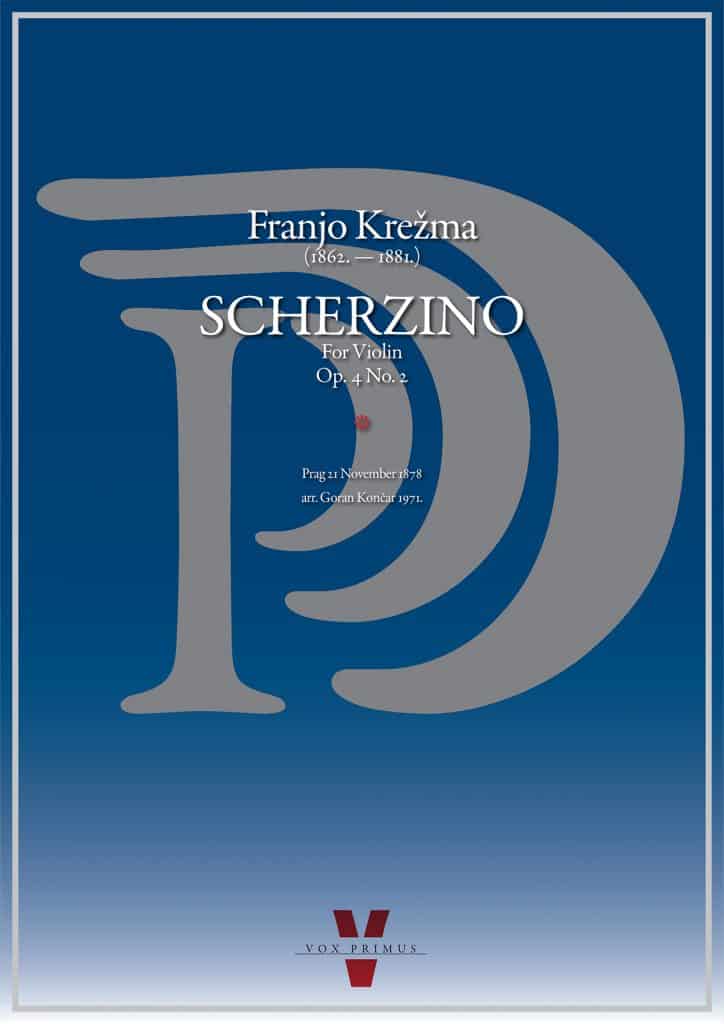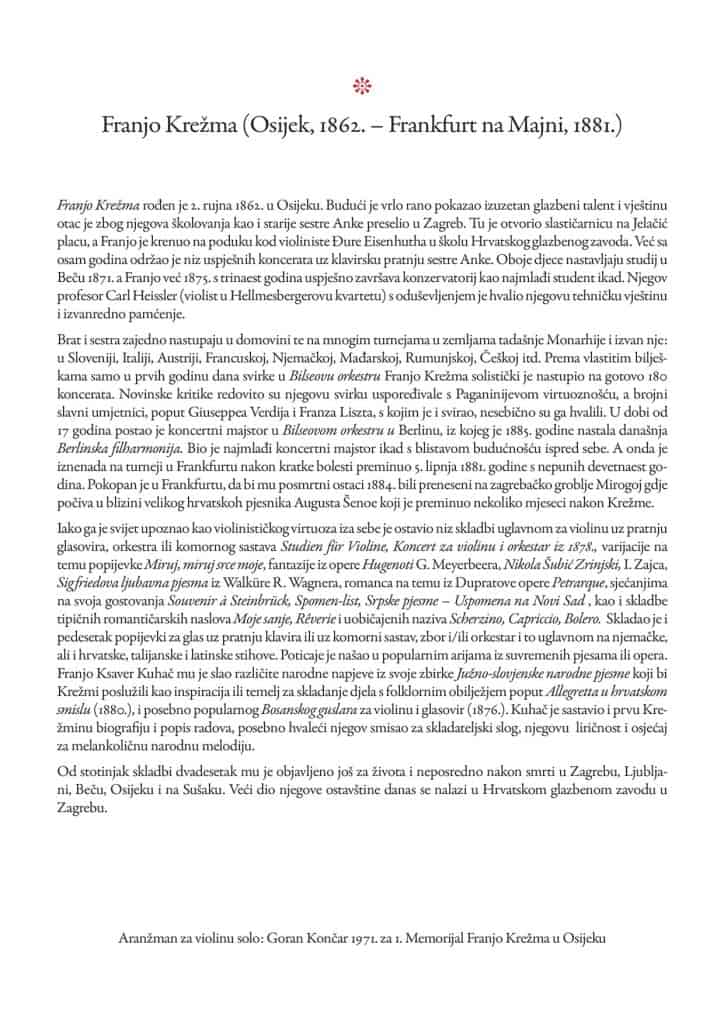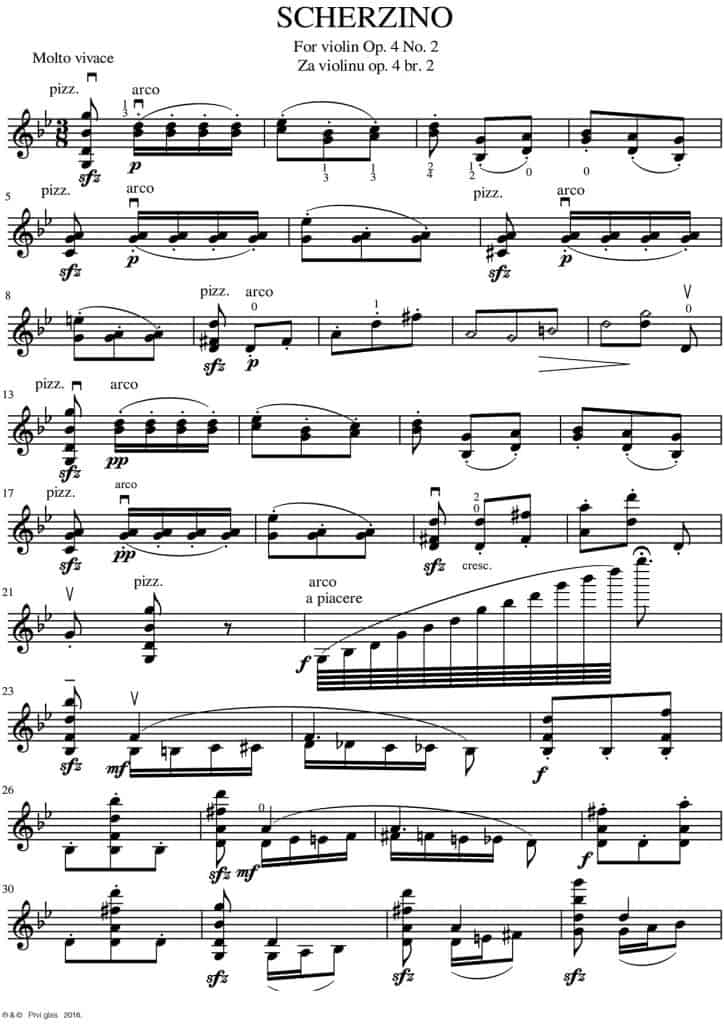About project
Scherzino
Franjo Krežma
Scherzino, for violin solo op. 4 br. 2
Although the world got to know him as a violin virtuoso, he left behind a number of compositions, mainly for the violin with piano, orchestra or chamber ensemble: Studien für Violine, Concerto for Violin and Orchestra from 1878, variations on the song Be Still, My Heart, fantasia from G. Meyerbeer’s opera Les Huguenots, Nikola Šubić Zrinjski by I. Zajc, Siegfried’s Love Song from R. Wagner’s Walküre, a romance on the motif from Duprat’s opera Pétrarque, memories of his tours Souvenir à Steinbrück, Memory Book, Serbian Songs: the memory of Novi Sad and songs with typically romantic titles…
Category: solo
Instrument(s): violin
Composer: Franjo Krežma
Arrangement for violin solo: Goran Končar
Design: Luka Gusić, Zagreb
Score: A4, 6 str.
Catalog No: Vox Primus 1/2016
ISMN: 979-0-801344-00-7
Released: 2016



About score
Franjo Krežma (Osijek, 1862 - Frankfurt am Main, 1881)
Franjo Krežma was born on September 2, 1862 in Osijek. From a very early age he showed remarkable musical talent and skill, so his father decided to move to Zagreb in order to provide the best musical education for him and his older sister Anka. There he opened a pastry shop on Jelačić Square, and Franjo took lessons with violinist Đuro Eisenhuth at the Croatian Music Institute. He was only eight when he held a series of successful concerts with piano accompaniment by his sister Anka. Both children continued their studies in Vienna in 1871, and in 1875 Franjo, then only thirteen, graduated from the Vienna Conservatory as the youngest student ever. His professor, Carl Heissler (a violist in the Hellmesberger Quartet), highly praised his technical skill and extraordinary memory.
The brother and sister performed together at home and went on tour in many countries of the former Austro-Hungarian Empire and beyond: Slovenia, Italy, Austria, France, Germany, Hungary, Romania and Bohemia. According to his own notes, during his very first year in the renowned Benjamin Bilse’s orchestra, Franjo Krežma performed solo at almost 180 concerts. Newspaper critics regularly compared his performances with the virtuosity of Paganini, and many famous artists, such as Giuseppe Verdi and Franz Liszt, with whom he played, praised him selflessly. At the age of 17 in Berlin he became the concertmaster at Bilse’s orchestra, which in 1885 went on to become the Berlin Philharmonic. He was the youngest concertmaster ever with a bright future ahead of him. Then, suddenly, while touring in Frankfurt, he contracted an illness and died shortly after, on June 5, 1881, before turning nineteen. He was buried in Frankfurt, and in 1884 his remains were transferred to the Mirogoj cemetery in Zagreb, where he now rests near the great Croatian poet August Šenoa, who died a few months after Krežma.
Although the world got to know him as a violin virtuoso, he left behind a number of compositions, mainly for the violin with piano, orchestra or chamber ensemble: Studien für Violine, Concerto for Violin and Orchestra from 1878, variations on the song Be Still, My Heart, fantasia from G. Meyerbeer’s opera Les Huguenots, Nikola Šubić Zrinjski by I. Zajc, Siegfried’s Love Song from R. Wagner’s Walküre, a romance on the motif from Duprat’s opera Pétrarque, memories of his tours Souvenir à Steinbrück, Memory Book, Serbian Songs: the memory of Novi Sad and songs with typically romantic titles: My Dreams, Rêverie and common names such as Scherzino, Capriccio, Bolero. He also composed fifty songs for voice with piano or a chamber ensemble, choir and / or orchestra, mainly to German, but also Croatian, Italian and Latin verses. He often found inspiration in popular arias from contemporary songs or opera. Franjo Ksaver Kuhač sent him various folk ballads from his collection South-Slavic Folk Songs, which served Krežma as inspiration or basis for composing works with elements of folklore, such as Allegretto à la Croata (1880), and in particular the popular Bosnian Fiddler for violin and piano (1876). Kuhač also compiled his first biography and a list of publications, particularly praising his sense of compositional style, his lyricism and his understanding of melancholy folk melody.
Of the one hundred and twenty compositions he left twenty were published during his lifetime and shortly after his death in Zagreb, Ljubljana, Vienna, Osijek and the isle of Sušak. Today much of his legacy is kept in the Croatian Music Institute in Zagreb.
Sanda Vojković (translated by Maja Tančik)
